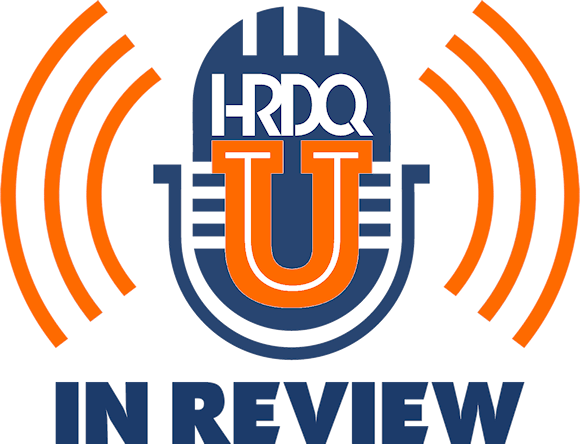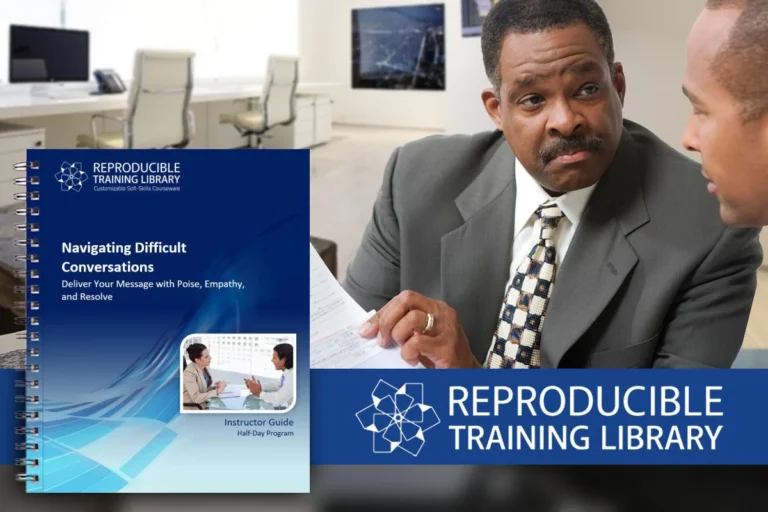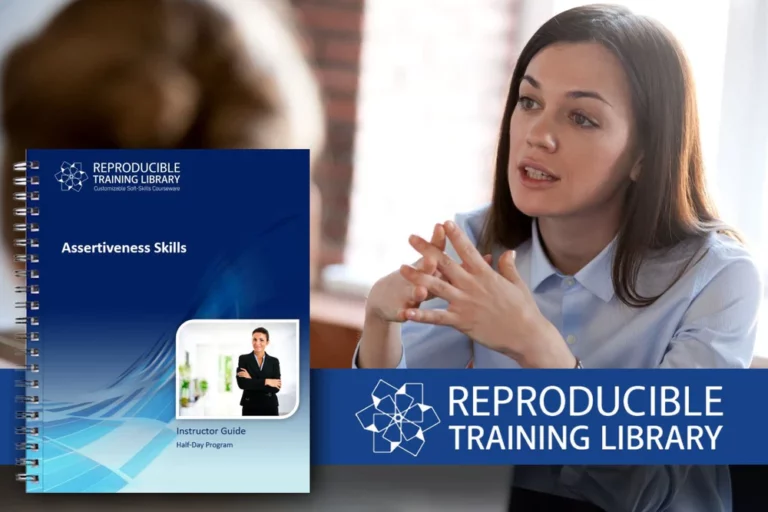Log In
View Upcoming Events


Difficult conversations are inevitable – but they don’t have to be unproductive. In this episode, we sit down with Chris Wong to explore strategies for managing tough discussions, avoiding common pitfalls, and ensuring your message is heard.
We also dive into highlights from our recent webinar, Mastering Difficult Behaviors in Hard Conversations, where we answered some of the biggest challenges professionals face when navigating conflict.
Tune in to learn:
Listen now and take control of your next tough conversation!
Resources and Links:
Watch the webinar: Mastering Difficult Behaviors in Hard Conversations
Get Chris’s course: Mastering Difficult Conversions and use code HRDQU for 10% off!
00:00
Welcome to this week’s episode of the HRDQ-U In Review podcast, where we bring you the latest insights and practical tools for enhancing soft skills training in your organization. This podcast is brought to you by HRDQU.com, and I’m your host, Sarah, Learning Events Manager at HRDQ-U. Today I have Chris Wong joining me back on the podcast to discuss the webinar that he presented this week over at HRDQ-U, Mastering Difficult Behaviors in Hard Conversations. Chris, thanks so much for joining me today.
00:29
Always a pleasure to talk to you, Sarah. Well, welcome back. You have been on, you’ve presented at many webinars here with HRDQ-U and you’ve been on a podcast here a handful of times as well. What have you been up to since we last spoke here on the podcast? Um, boy, what’s a big question. What have I been up to? Just continuing the work, continuing to, uh, coach leaders, continuing to work with organizations around culture and
00:58
being better leaders, navigating difficult relationships and conversations. And since our last conversation, mean, things are changing at such a rapid pace. What major shifts have you seen in the L&D space? I don’t think any major shifts in the past. I think I was only on here like a few months ago. I don’t know if there’s any major shifts, but I did read a recent article around how companies should be embracing AI. And I think
01:27
That continues to be the main conversation. And I think that’s going to be the main conversation for L&D folks is how do you, how do you start defining what good AI use looks like? And that’s the role. The leaders should be deciding that, but like, what do we want to use AI for? It’s not about whether we should use AI. It’s really more, do we use AI in an appropriate and responsible way, but to use it to really enhance our work, not to use it in place of having somebody do the work.
01:56
Chris, we recently did this webinar just this Wednesday on mastering difficult behaviors in hard conversations. We had a fantastic response from the audience. There was lots of great questions and engagement. You shared a personal story which was really interesting and you intertwined that throughout the webinar. Were there any common themes or follow-up questions that stood out to you? I think the biggest one that I saw, which is one that I’ve heard before is…
02:24
How when is it time to stop being kind and start being firm and I get that question a lot and I see that question a lot everywhere the idea that those are two opposites you can’t be Kind and firm at the same time. I think that’s not true. I think you can be kind and firm You can be respectfully sharing that this is the barrier or boundary that I’m setting we’re not going to be yelling We’re not gonna be swearing at each other. We’re not gonna be lying with each other. We’re gonna tell the truth
02:54
It’s okay to say that it’s okay to do that respectfully to also end the conversation say Listen, I think we need to take a break. I think what things are getting heated Let’s both relax and come back to the conversation or you know what? I don’t think this conversation is really helpful for either of us right now. Let’s let’s end this conversation But that doesn’t mean you have to be either or you’d want to be firm and say you’re a jerk. We’re ending it you lose Like that’s not that’s not the opposite right? That’s that’s just being a jerk in general. Yeah
03:23
Yeah. And what about what’s the first step you would say someone should take when they’re applying the strategies that you discussed during the webinar in real conversations? You know, it’s really, I think, you know, talking about the theory of something is one thing, but then being able to really implement those into actions is something different. So what’s the first step you would suggest? I would say just find ways to practice it. I think there’s especially because of the things that I was talking about.
03:50
where like reflections, summaries, asking good questions, being silent. You could practice those anywhere on anybody and you don’t have to be in hard conversation. They don’t have somebody fight against you, right? You could have your partner be sharing about their day and they’re talking about some kind of struggle. And instead of trying to solve the problem, you say, that sounds tough. That’s a reflection. Simple. You can just see how it lands. No big deal, right? You could just…
04:18
Do these things on an everyday basis. Even if you’re just watching TV, you could just see two characters fighting and just say, I think that character seems frustrated. go beyond the, if the two characters are arguing, go beyond what they’re angry, what they’re saying, and try to just see if you can interpret what are they really angry about or frustrated about, or are they scared about something and it’s coming out as anger. But just look at that lens to see if you can start seeing that.
04:47
the way people are presenting isn’t always how they’re actually feeling on the inside or down beneath. And can you start putting words to that and say that out loud, you know? And, you know, we had over 500 registrants at this event. This topic, you know, difficult conversations and behaviors and managing that in the workplace is a pressing topic that clearly many are looking to seek advice and guidance on how to improve.
05:12
What would you say some common mistakes are that people make when they’re trying to manage difficult behaviors and how can they avoid them? I think the common ones are not preparing, not having a good goal in mind. You just go in there willy-nilly and you’re just ready to go and just jump in there. The other one is not preparing and not preparing yourself emotionally for what might happen. So I think during the webinar I shared that I worked with a client a few weeks ago.
05:42
who went into a conversation that he realized later as we were talking, he realized he was already frustrated going into it and expecting to be angry. And lo and behold, he got angry during the meeting and started yelling at the other person. And so it’s that part of the preparation we were talking about, I was talking about with him was think about it before you go in, how can you prepare so that you can control yourself? And for him, it was really helpful. He said that it was really helpful that he was able to go into, I just talked with him this morning.
06:11
He went, he worked with her all this past week and we had like a really good conversation with her on Monday about how they’re going to better work together. And he said, it felt like a weight was lifted after they had a good conversation because he had gone in there with a plan of how he was going to keep himself calm. even though he kind of, even if he expected the worst, he had a plan for how to manage it. If it did go that way. And he said, but luckily it didn’t. I was able to keep everything positive. Felt like a weight was lifted. They were able to solve a problem that they had together about working around.
06:40
the COO. So a lot of that preparation, they’re not, people aren’t generally doing, they’re preparing like maybe the logistics. I think the easiest thing that people do is like, I’m going to bring the evidence that this other person did something wrong, especially if it’s an employee or of some sort. I’ll have this evidence, which is great. You should have that. They’re not also, they’re also not doing as much work on what are the ways that could go wrong and trigger me. And so how am going to manage it? And then how am I going to also just stay focused on the test?
07:10
And then also once you get into it, I think the biggest problems are just not listening. You hear something, you get triggered, and then you immediately just latch onto that idea or whatever, latch onto whatever triggered you. And so you just keep cycling off of that and just keep getting angrier and angrier or sadder and sadder or more just want to run away from the conversation. So you just want to end it as soon as possible. So a lot of just a lot of these logistics and emotions of the conversation are hard for people.
07:40
And you mentioned hearing, not listening. I think probably, I would assume, a struggle for many is that they do hear. It’s they hear something and then maybe they’re thinking about what their response is going to be or they’re having a hard time, you know, focusing on what’s the, you know, the other person is conversing in the conversation. Do you have tips so that someone can stay focused to really listen to, you know, what the other person is saying before, you know, letting their mind wander?
08:08
to how they’re going to respond. Yeah, a lot of times, well, number one, you should have a coping skill of yourself, whatever it is, whether it’s grounding. So I think I mentioned like, I’ll have a wedding ring. I’ll just I’ll take it off and I’ll just kind of like move it around and I’ll circle that during it. I’ve had clients, I’ll take a rock or something small, some kind of small object and just press into it when they get anxious or they feel like they need to hold themselves back from talking. And so they feel that pressure. And so they’ll just put that they’ll just squeeze that rock or object.
08:38
so that they’ll put that pressure into that instead. So having that was helpful first and then the second thing that people most stress out about is what am I going to say in response to whatever they’re doing? They’re yelling at me, they’re lying or whatever. I say the easiest thing to think about is don’t worry about what you’re going to say, just really focus and only try to understand what they’re saying. If you can listen deeply and figure out they’re saying, they’re yelling, they’re yelling, they’re yelling.
09:06
And if you could just ask yourself, wonder why they’re yelling. What is it that they’re angry about? it that, is there some kind of common theme thread that keeps coming across all the things they’re saying out loud? Or is it just, they keep jumping from topic to topic and then they, you know, they’re, if it’s a work situation, like they keep yelling about work and you and coworkers and other managers and the CEO, and then they drop one line about something happening at home and then they move on and talk about some of the other things. That’s a real.
09:35
Big clue if they randomly talk about one thing that has nothing to do with every other topic, that means there’s something there that’s bothering them. And so the more you can focus on just what are they saying, and then all your response has to be is just focused on that response. So that’s why I say like reflections are really good and say, it sounds like something is really bothering you and it’s making you feel upset at this idea of this conversation. Right? You don’t have to worry about trying to say something that’ll help diffuse it. You’re just,
10:05
here trying to understand what is it that they’re upset about or angry about or sad about. Yeah. And I think we’ve all been in a situation where we’ve had a conversation, a difficult conversation, and we’ve left feeling a little bit more confused or stumped or just like wondering how that went. How do you gauge whether your approach to that difficult conversation was successful? Are there signs that one can look for during or after the conversation?
10:32
I would say the goal, think about the goal of the conversation. What was the original goal of the conversation? And I think this is where I try to always impress upon people like how important this goal is because everybody thinks of the goal wrong. Like sometimes people just want to vent at you. Like if you interrupted me a lot during the meeting and maybe you even said some disparaging things about me, I can come up to you and I’m gonna say, I need to yell at you. In my mind, I’m gonna say, I need to yell at you.
11:01
And I need you to like do something different in the future. But me venting at you is technically a goal, but it’s not going to change your mind. You’re not going to then decide to go change your behavior after that. So nothing I say will help in that situation. So to me, it’s going to feel like a failure because in my mind, I think I said everything I needed to say. And so in that sense, yes, I was successful. I vented at you. I yelled at you. And there’s no confusion about how I feel about the situation.
11:29
But if in my mind, I also thought the goal was really to change your behavior, then I think I failed. Or then I’m gonna think I failed in that situation. So it’s really being really clear on the goal. Is it that I need you to change your behavior in some way? I wanna change your perspective. So I’m trying to influence you in some way or persuade you to do something or think something different. Do I just need to give you a warning or a PIP or something like that, right? A performance improvement plan.
11:58
In those situations, like the goal is I need to give you this written warning and you need to understand that. It may not be that you love me and you think I’m the greatest manager in the world after that. Right. Because I don’t know how realistic that’s going to be if I give you a written warning, but it’s being realistic about what the goals are. And then you can be clear about what a that’s the success measure. Right. Like it’s we, we, think in these kinds of conversations, we’re putting a way too much stock in like having people like us.
12:26
in the conversation. It doesn’t mean we have to be, again, it doesn’t mean we have to be unkind in the conversation, but you know, if our goal is just to have people like us, then we just don’t even need to give any consequences or have any boundaries to say, you know what, do what you got to do. You live your life. And you addressed this one a bit during our webinar, but when someone pushes back or they become defensive during a difficult conversation, what’s the best way to steer the discussion back on track?
12:56
I just remind them of the ground rules and the goal of the conversation. say, and I, it’s a mixture of all these things, right? So I’ll remind them, Hey, listen, if they start getting, if they start yelling, or if they start getting defensive, I say, Hey, listen, I know this is tough. So a little bit of reflection. This is hard for you. I this is hard for me to have this conversation too. You know, earlier on we talked about, we’re going to, we’re going to make sure we talk about this topic in the conversation. Uh, do you feel like we can continue this conversation? Do you want to take a break? Do you?
13:25
Do you feel good about this? But I want to make sure we have this conversation in a respectful way that works for both of us. Great. And Chris, before I wrap up today, where can listeners go follow your latest work? You can always find me on my website, myleadershippotential.com. LinkedIn is where I’m most active, Chris Wong LMHC. That’s where I post the most or just talk to people the most.
13:55
You can always email me at myleadershippotential.com. I also have a podcast, The Art and Science of Difficult Conversations, where I just dive, me and my co-host, we just dive into difficult conversations and we interview guests about all types of difficult conversations to get better at them. then, oof, excuse me. But then also I have a couple of courses. I have a free course on performance coaching for managed, for first time managers. That’s a free one hour course you can take, give good feedback.
14:24
Feedback format as well as goal setting formats for people. Uh, and then I have a difficult conversations course, which is, uh, I like to partner with HRDQ- U. So if you use the code HRDQU, you get 10 % off. Uh, if you buy the course and the course comes with one-on-one sessions with me, because I, I, I believe that just having the information is one thing, but being able to apply it means you need extra support. So I want to support you in doing that. Great. Well, thank you, Chris, for your time today. Thank you as always, Sarah. Good talking to you.
14:54
And yes, if you have yet to check out the webinar, I highly suggest you do so. We will have that linked below. We’ll also have the course linked below with the coupon code there so that you can get your discount and savings. And with that, we hope you enjoy listening to the HRDQ-U In Review podcast available on all major streaming platforms. If you did enjoy today’s episode, make sure to give us a follow and leave us a five-star review. Thank you all for tuning into this week’s episode of the HRDQ-U In Review podcast brought to you by HRDQU.com.


Listen to this podcast event at no charge with your
HRDQ-U Free Access Membership
Difficult conversations are inevitable – but they don’t have to be unproductive. In this episode, we sit down with Chris Wong to explore strategies for managing tough discussions, avoiding common pitfalls, and ensuring your message is heard.
We also dive into highlights from our recent webinar, Mastering Difficult Behaviors in Hard Conversations, where we answered some of the biggest challenges professionals face when navigating conflict.
Tune in to learn:
Listen now and take control of your next tough conversation!
Resources and Links:
Watch the webinar: Mastering Difficult Behaviors in Hard Conversations
Get Chris’s course: Mastering Difficult Conversions and use code HRDQU for 10% off!
[ PODCAST PLAYBACK ]
You must be signed-in with your membership account to access this content.
Enjoyed this podcast? Have suggestions on how we can improve? Please take our quick survey and receive a coupon for 15% OFF any of our individual membership plans.

*Instant 15% coupon available upon completion of survey.
Want to learn more? Become an Individual or Corporate member to watch this and hundreds more webinars!
Navigate hard conversations with confidence. Learn effective techniques for handling tough topics and strengthening relationships.

Chris Wong
Chris Wong is a certified executive coach, licensed therapist, and seasoned leadership development professional with a proven track record in the nonprofit sector. He specializes in guiding leaders through strategic prioritization, confident navigation of difficult conversations, and fostering high-performing cultures. As a facilitator and public speaker, Chris has trained hundreds of leaders and spearheaded successful organizational projects. His extensive experience spans nonprofit, health insurance, and government systems and encompasses leadership development, strategic planning, change management, and diversity, equity, and inclusion.
Currently, he partners with human service nonprofit executives to execute strategic plans, addressing challenges such as conflict resolution, culture enhancement, productivity improvement, and fostering inclusive work environments.
Website: www.myleadershippotential.com

I work with human service nonprofit leaders to execute their strategic plans so they can have the impact they want. I also work with HR and L&D departments to build leadership development programs that get results.
Training Tools for Developing Great People Skills
This event is sponsored by HRDQ. For 45 years HRDQ has provided research-based, off-the-shelf soft-skills training resources for classroom, virtual, and online training. From assessments and workshops to experiential hands-on games, HRDQ helps organizations improve performance, increase job satisfaction, and more.

Navigating Difficult Conversations Customizable Courseware
Discover a comprehensive seven-stage method for effectively handling difficult situations. This approach focuses on reducing negative responses, creating a low-stress environment, building trust, improving relationships, and boosting overall productivity.
Buy at HRDQstore.com
Assertiveness Skills Customizable Courseware
Assertiveness skills play a crucial role in both professional and personal development by fostering better conversations and strengthening relationships. Develop the essential tools and practice needed to become more capable, effective, and self-assured.
Buy at HRDQstore.comThe HRDQ-U In Review Podcast, brought to you by HRDQU.com, brings you the latest insights and practical tools for enhancing soft-skills training in your organization. As a learning community for trainers, coaches, consultants, managers, and anyone passionate about performance improvement, we interview subject matter experts and thought leaders from recent webinars they presented with us to take a deeper dive into the content they shared and answer all your questions. Join us as we explore new ideas and industry trends, share success stories, and discuss challenges faced by professionals.
The HRDQ-U In Review Podcast is intended for HR and training professionals, organizational development practitioners, and anyone interested in improving workplace performance and productivity.
New episodes of HRDQ-U In Review are released every week.
The length of the episodes varies, but they typically range from 15-30 minutes.
The podcast covers a wide range of topics related to HR and organizational development, including leadership development, team building, communication skills, conflict resolution, employee engagement, and more.
No, HRDQ-U In Review is completely free to listen to.
You can listen to any available HRDQ-U In Review Podcast right on our website at HRDQU.com via our embedded Spotify player on the related webinar page. In addition to our self-hosted option, you can find the HRDQ-U In Review Podcast on many of the popular streaming services, which are listed above.